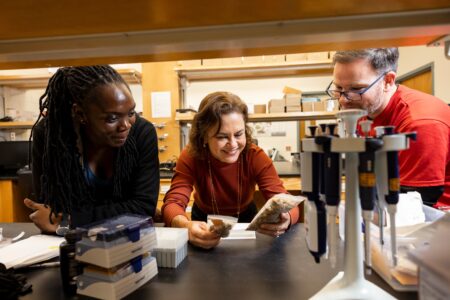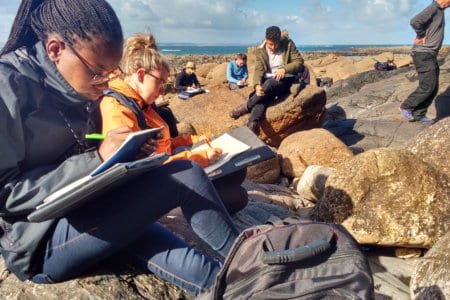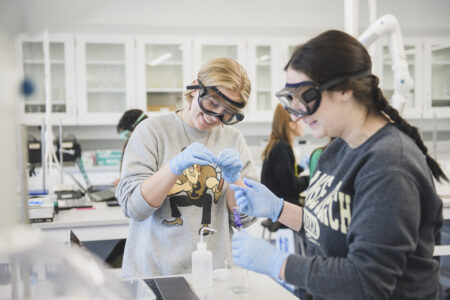
Our world is full of geological challenges that impact our daily lives and the planet. Earthquakes, like the 2011 Tōhoku quake in Japan, can ravage cities, while volcanic eruptions, such as the 2010 Eyjafjallajökull eruption in Iceland, can disrupt air travel and communities. Landslides and erosion reshape landscapes, wrecking homes and risking local lives. Climate change is also a major factor, melting glaciers and causing rising sea levels, leading to flooding and erosion.
But there’s hope. Earth, environmental, and geoscientists are addressing these global challenges through innovation and research. They are crafting solutions to temper climate change, better manage nature, and reduce the impact of disasters. Their work include finding sustainable ways to use water, minerals, and energy and restoring resources in peril. By advancing our understanding and improving strategies for disaster preparedness and resource management, these scientists play a key role in creating a more resilient and sustainable world.
Universities play a big role in this effort, training the next generation of geoscientists equipped to tackle these pressing issues. If you’re interested in joining this impactful field, consider these top institutions:

Source: University of Northern Colorado
University of Northern Colorado
The Department of Earth and Atmospheric Sciences (EAS) at the University of Northern Colorado is committed to equipping students with the knowledge and skills they will need to spark global change. Its small class sizes and a student-to-faculty ratio of about 10:1 ensure personalised instruction and meaningful engagement. Here, faculty members are passionate about their work and dedicated to helping each student succeed. Even graduates return frequently to provide support and mentorship to students keen on following in their footsteps.
Located near Denver and Rocky Mountain National Park, the university provides an ideal setting for mentors and mentees to collaborate. Beyond campus, they can often be found exploring the Poudre River, chasing storms across state lines, or studying volcanoes and weather patterns abroad. These experiences, combined with undergraduate research opportunities and technical training, make EAS graduates highly marketable in a competitive job market. Indeed, it’s a rigorous journey, but Northern Colorado’s natural beauty helps learners effortlessly balance the rigours of a world-changing education.
Among the department’s diverse academic offerings, two standout programmes unlock the full EAS experience: the BS in Earth Sciences with a Geology Emphasis and the BS in Earth Sciences with a Meteorology Emphasis.
The geology concentration focuses on Earth materials and processes, where students explore the history of the planet to find solutions to complex Earth problems, including natural hazards (landslides, earthquakes, and volcanic eruptions) and energy production. Meanwhile, the meteorology emphasis delves into understanding the atmosphere and its phenomena, from the large-scale weather patterns behind any daily forecast to the tornadoes and tropical storms that produce extreme winds and rain.
Both programmes highlight the importance of the physical sciences in society and the environment, equipping learners with critical thinking and effective communication skills. They also have a strong interdisciplinary focus on climate change, preparing graduates to tackle environmental challenges in a warming world, on a local and global scale.
If you’d like to make meaningful contributions to our planet’s future, learn more about the EAS department today.

The School of Earth and Space Exploration integrates science, engineering, and education to offer top-ranked programmes and world-class research opportunities, driving groundbreaking discoveries. Source: Arizona State University/Facebook
Arizona State University
At Arizona State University’s School of Earth and Space Exploration, students and faculty are on a mission to uncover the mysteries of our planet, solar system, and the universe beyond. They’re asking big questions that could change how we understand the world and what lies beyond it.
What sets this school apart is its combination of science, engineering, and education. This blend gives students a unique chance to get involved in cutting-edge research that not only solves problems here on Earth but also leads to new discoveries in space. The programmes offered, like Astronomical and Planetary Sciences or Earth and Environmental Sciences, emphasise the importance of technology in today’s scientific research.
Students here aren’t just learning in classrooms — they’re actively participating in research. They have opportunities to get involved in research, with focus areas including Cosmology, Astronomy, & Astrophysics, Earth and Environmental Sciences, Planetary Science, Science Education, and Systems Engineering. The best part? Students get to work alongside experts, building relationships that could last a lifetime. Plus, these research opportunities aren’t just for credit; students get paid through faculty projects or the NASA Space Grant, which supports research across all the school’s majors.
The School of Earth and Space Exploration is home to over 40 state-of-the-art instrument facilities and laboratories, where faculty lead research in fields like geological science, planetary science, astronomy, cosmology, and more. This environment creates a collaborative spirit, spurring students to think boldly and explore the unknown.

CEOE’s aims to advance scientific knowledge of natural and human systems through leading research and teaching, ensuring science informs policy and engages communities for sustainable outcomes. Source: University of Delaware/Facebook
University of Delaware
The College of Earth, Ocean & Environment (CEOE) at the University of Delaware fuses cutting-edge technology with hands-on learning in ocean, earth, and atmospheric sciences. The college educates future scientists and policy experts who can tackle global issues like climate change, marine pollution, and energy independence.
CEOE’s approach is rooted in the understanding that solving complex environmental challenges requires a multidisciplinary lens. The curriculum is designed to reflect this, offering a wide range of majors, such as Earth Science Education, Environmental Science, Meteorology, and Climate Science. Regardless of the programme, students will learn from a distinguished faculty that includes members of organisations like the National Academy of Sciences and the American Association for the Advancement of Science.
Here, students are encouraged to step out of the classroom and into the real world. Whether studying the diverse ecosystems in Delaware’s woodlands or exploring geological wonders across the American West, the emphasis is on experiential learning. CEOE ensures students gain practical skills through fieldwork and state-of-the-art technology.
Opportunities for research are plenty. The Semester-in-Residence programme at the Hugh R. Sharp Campus and the summer Research Experience for Undergraduates are just some avenues available for hands-on learning. Students can also engage in study abroad programmes, internships, and special projects that enhance their academic experience.

CEOAS accelerates discovery and innovation through collaborative research, brilliant faculty and students, cutting-edge technologies, and a strong commitment to solving problems for communities and the planet. Source: Oregon State University/ Facebook
Oregon State University
The College of Earth, Ocean, and Atmospheric Sciences (CEOAS) at Oregon State University is a hub of groundbreaking research and education. Whether it’s exploring the deepest ocean trenches, scaling remote mountain peaks, or studying the impacts of climate change, CEOAS is at the forefront of discovery. The college’s scientists and students are committed to understanding the Earth’s complex systems, and their work spans from state-of-the-art laboratories to the communities that benefit from their findings.
CEOAS is playing a vital role in preparing for the future. They are leading projects like building new ships for the US academic research fleet and studying the risks of a future Cascadia Subduction Zone earthquake. The college is working with coastal communities to help them prepare for natural hazards, all while contributing to US energy independence by developing wave energy devices.
In addition to their research, CEOAS is deeply committed to education. The college is home to Oregon’s only comprehensive oceanographic and atmospheric research programmes, offering top-tier education in geology, geography, and environmental sciences. Students are actively participating in research that has real-world impact. Whether it’s collecting ice cores in Antarctica or developing sustainable practices for local fishing communities, CEOAS students are gaining hands-on experience that will prepare them for diverse career paths.
CEOAS is a community dedicated to advancing our understanding of the Earth and its systems. Their work connects cutting-edge science to pressing societal issues, making a tangible difference in the world today and for future generations.
*Some of the institutions featured in this article are commercial partners of Study International










